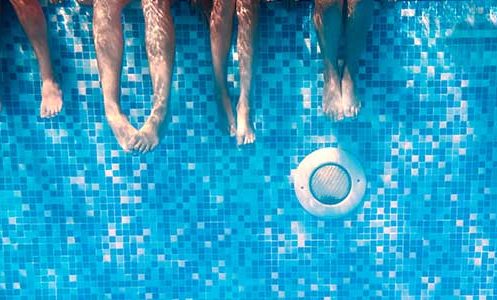We hope these electrical safety tips are helpful. Playing it safe around electricity anywhere is always key. Exercising caution when it comes to electrical safety is an important way to make sure you and your family enjoy a safe summer full of fun!
WATER AND ELECTRICITY DON’T MIX!
• Don’t use household electrical cords! When using electricity near water, only use GFCIs or shore cords, including “Y” adapters, that are UL-Marine listed. These are specifically designed to keep you safe when using them near water.
• Close the covers on poolside electrical outlets not in use and ensure all electrical outlets near water are properly grounded including a ground fault circuit interrupter (GFCI).
• Whenever possible, use battery-operated gear around water and keep all electrical devices and cords at least 10 feet from water. However, never handle electrical devices—even battery-powered ones—while wet or sweating heavily.
• Situate your pool well away from powerlines and never below them.
• Get your pool regularly inspected by a licensed electrician.
• If you feel a tingle while swimming, the water may be electrified. Swim back in a direction where you did not feel the tingle and get out of the water as soon as possible! Avoid the use of metal objects such as ladders. Notify the owner of the property immediately. Power should be turned off until a proper inspection is completed.
• Stay off or out of the water before, during and after thunderstorms. Pay attention to weather reports and forecasts. Head for the nearest shore if a thunderstorm is approaching
BOATING ELECTRICAL SAFETY TIPS
The last thing you want is a boating accident or electrical mishap to put a damper on your good time. Here are some boating electrical safety tips to help you stay even safer on the water:
• Always check for nearby powerlines before boating, fishing or swimming. Maintain a distance of at least 10 feet between your boat and nearby power lines at all times.
• Never swim near the dock or a boat while it’s running. Electrical system wiring can leak electrical current into the water, putting swimmers at risk of electrical shock drowning (ESD). Oftentimes, ESD doesn’t look like what you would normally envision as electrocution. A strong enough electrical current will either stop the swimmer’s heart or cause muscle paralysis, resulting in drowning.
• If you don’t already, consider having equipment leakage circuit interrupters (ELCI) installed on your boat. The Electrical Safety Foundation International (ESFI) recommends using these devices to protect nearby swimmers from potential electricity leakage into the water surrounding your boat.
• Properly maintain your boat. Have it inspected annually, and test ground fault circuit interrupters (GFCI) and equipment leakage circuit interrupters (ELCI) each month. Have a certified marine electrician inspect your boat’s electrical system and perform any needed upgrades on a regular basis.
• Make sure you know where main breakers are located on the boat and on the shore. Be familiar with your boat’s electrical panel. If there is an electrical emergency, you need to know where to cut the main power quickly.
Want more electrical safety tips? Visit our Electric Safety page.



